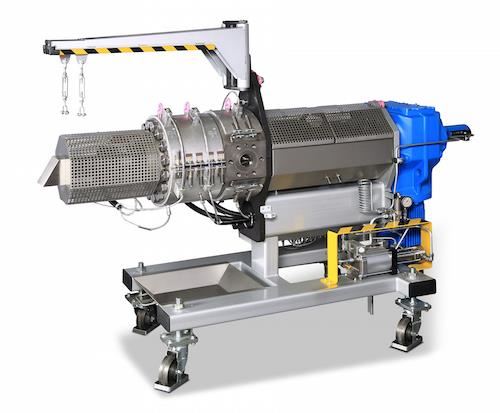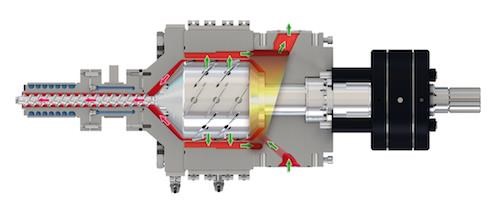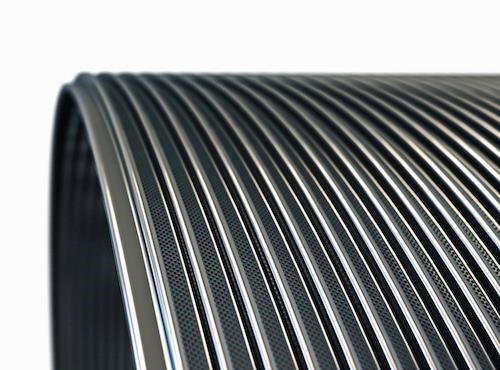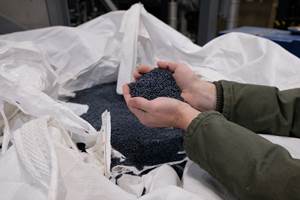RECYCLING: New Melt Filtration System for Highly Contaminated Plastics
The new system from Nordson seeks to boost recycling productivity and minimize melt loss.
Nordson Corp., Westlake, Ohio, will introduce a new melt filtration system for recycling highly contaminated plastics at K 2016 (Hall 9, Stand A44/48).
The BKG HiCon R-Type 250 Nordson Polymer Processing Systems (PPS) equipment transforms highly contaminated polyolefin or styrenic plastics into clean, high-quality material and exhibits less melt loss than with traditional backflush systems for highly contaminated plastics, says Nordson PPS business unit director, Sven Conrad.
The central concept of the HiCon R-Type 250 system involves the use of a cylindrical “separating head” with knives arranged on its surface in a helical pattern designed to move contaminant particles forward as the head rotates. Enclosing the head is a stationary filter element called a “strainer tube.” When contaminated melt from an entry port flows into the cylindrical space between the rotating head and the strainer tube, the knives capture the contaminant while the contaminant-free melt moves through the strainer into flow channels that lead to an exit port. At the same time, the rotating head turns a screw which guides the contaminated material through cooling sections and finally to where it is discharged into collecting bins.
“Nordson’s newest development cleans much more efficiently than commercial available filtration systems for highly contaminated polymers,” says Conrad. “The special design makes possible a uniform load on the strainer tube during the cleaning process, providing an extended lifetime for the filter and scrapers and increasing the overall efficiency of the system at far less melt loss.”
A powerful drive actuates the separation head / discharge-screw assembly. The HiCon R-Type 250 system operates at a maximum pressure of 350 bar and maximum temperature of 320 °C. Throughput can range from 500 to 1,500 kg/h. The rate depends on polymer viscosity, filtration fineness, levels of contamination, and other factors. As it exits the system, filtered polymer is maintained at a constant pressure, ensuring uniform processing downstream.
One key to the efficiency with which the HiCon R-type 250 system removes contaminants is the design of the steel strainer tubes, which are available with micro-holes ranging from 120 to 750 microns. The holes are conical in shape, permitting passage of molten polymer while preventing blockage by contaminant. This design and the symmetrically positioned knives in the drum contribute to the long working life of the tube before it needs to be replaced. Once cleaned, moreover, the tube can be reused.
Replacing a strainer tube is facilitated by a built-in swiveling arm for removing the strainer tube housing, and by a hand-operated hydraulic device for disassembling it. To ensure uninterrupted production, it is possible to operate two HiCon R-type 250 systems in parallel.
“A network of several Siemens SIMATIC control and monitoring units contributes to the high level of automation and ease of use that distinguish the HiCon R-type 250 system,” says Rolf Schultheis, Nordson PPS manager of electrical engineering. “The Siemens control system is intuitive, instantly providing a visualization of all process parameters. The onboard Ethernet / Profibus interface opens the possibility of integrating communication with other devices, collecting and recording production data, and even performing remote maintenance.”
HiCo R-type melt filtration systems are available from Nordson worldwide.
Related Content
Extrusion Technology Extended to Injection, Enabling Up to 100% Regrind Usage
Twin-barrel (shot-pot) press can handle more regrind, offers other benefits to molders.
Read MoreMultilayer Solutions to Challenges in Blow Molding with PCR
For extrusion blow molders, challenges of price and availability of postconsumer recycled resins can be addressed with a variety of multilayer technologies, which also offer solutions to issues with color, processability, mechanical properties and chemical migration in PCR materials.
Read MoreNew Facility Refreshes Post-Consumer PP by Washing Out Additives, Contaminants
PureCycle prepares to scale up its novel solvent recycling approach as new facility nears completion.
Read MoreOptical Sorting for Color Flexibility in Recycled Plastics
Aaron Industries added optical sorting to its operation, expanding capabilities to meet the color needs of customers.
Read MoreRead Next
Lead the Conversation, Change the Conversation
Coverage of single-use plastics can be both misleading and demoralizing. Here are 10 tips for changing the perception of the plastics industry at your company and in your community.
Read MoreFor PLASTICS' CEO Seaholm, NPE to Shine Light on Sustainability Successes
With advocacy, communication and sustainability as three main pillars, Seaholm leads a trade association to NPE that ‘is more active today than we have ever been.’
Read MoreBeyond Prototypes: 8 Ways the Plastics Industry Is Using 3D Printing
Plastics processors are finding applications for 3D printing around the plant and across the supply chain. Here are 8 examples to look for at NPE2024.
Read More


















